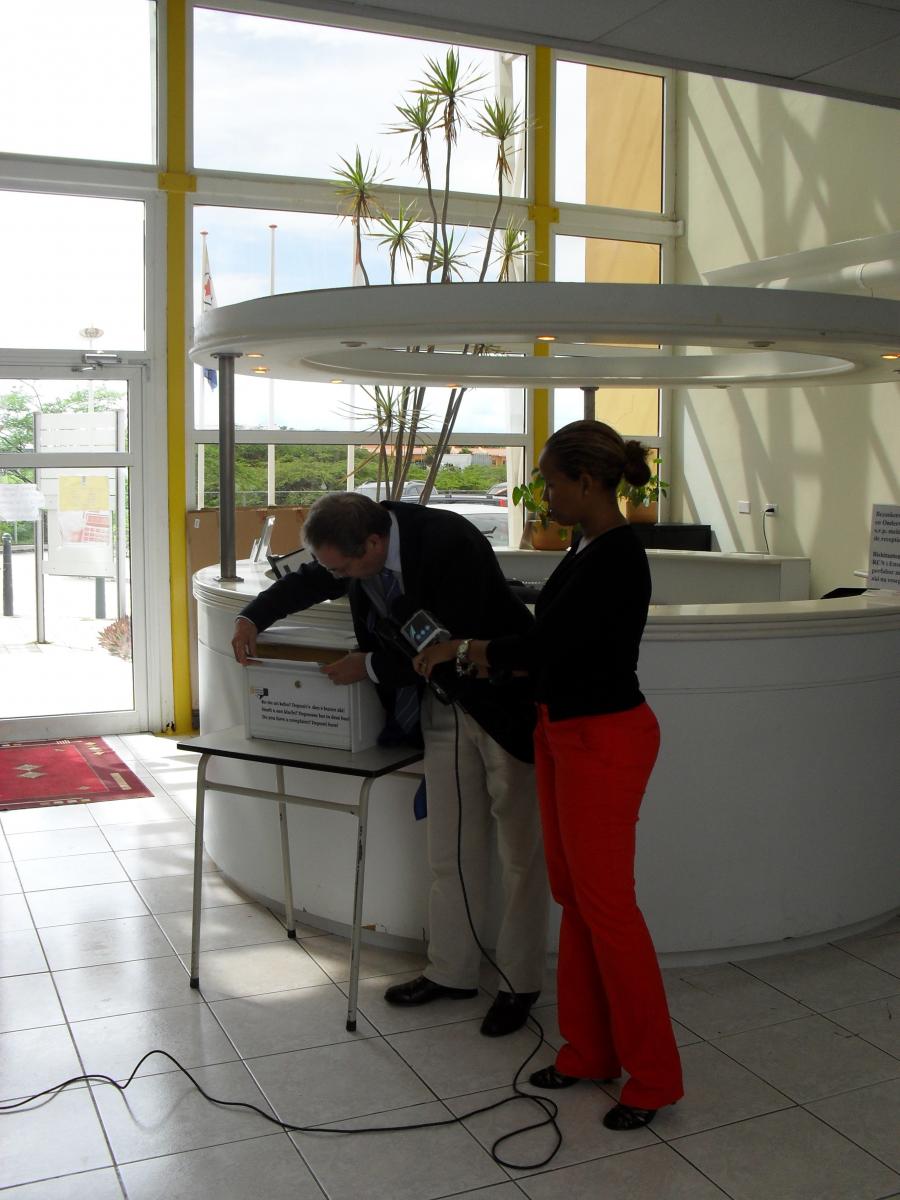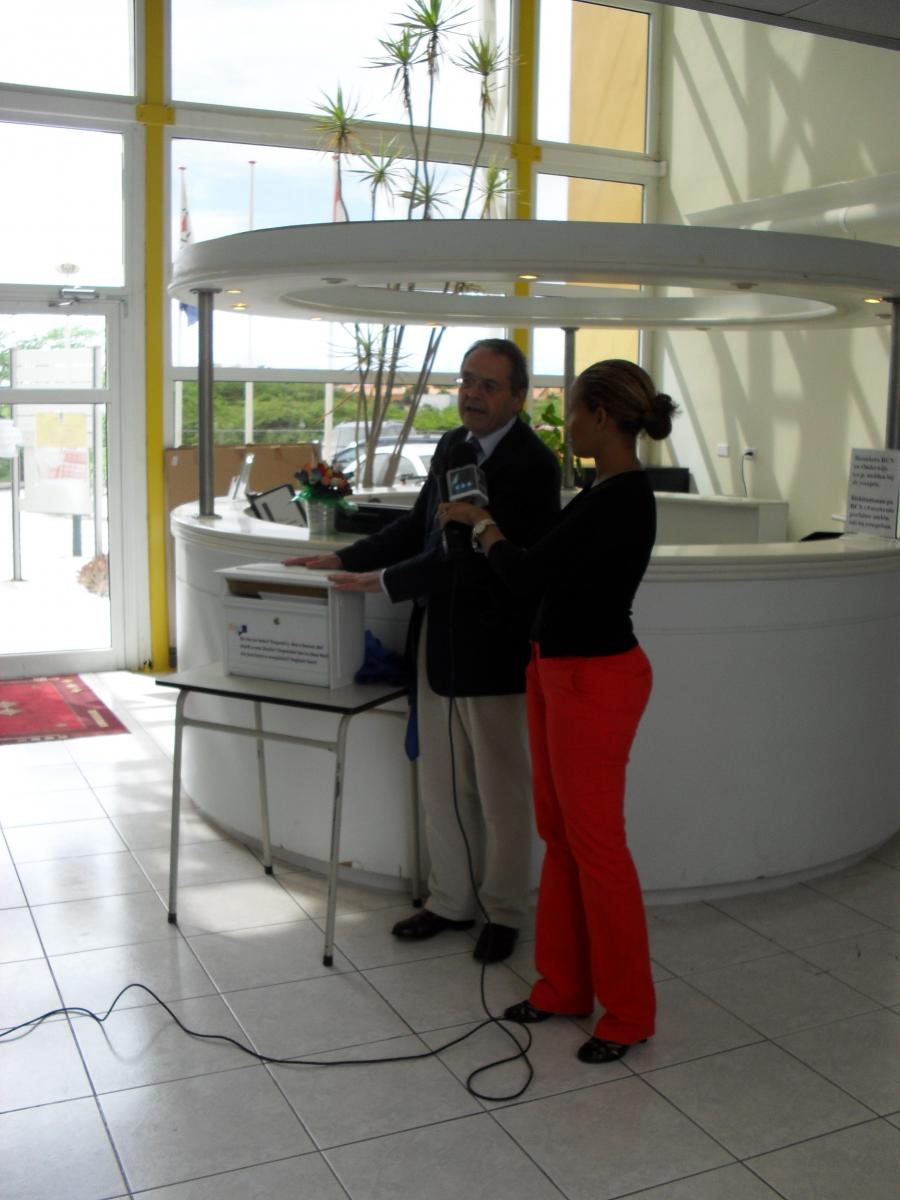
kop



Op woensdag 4 november 2010 is op Bonaire door de Nationale Ombudsman de klachtenbox onthult. De klachtenbox staat in het RCNgebouw en daar kunnen de klachten over de Rijksoverheid gedeponeerd worden.
Tijdens de presentatie is gebleken dat de klachten in deze "klachtenbox" door het RCN in eerste instantie bekeken gaan worden. Daarom is ook het voorstel om binnen een maand een directe telefoonlijn en een direct e-mailadres naar de Nationale ombudsman te regelen met applaus ontvangen door de bewoners van Bonaire.
Met nadruk is nogmaals bekend gemaakt dat deze klachtenbox alleen voor de Rijksoverheid gebruikt kan worden en dat voor de klachtenbox voor de lokale overheid aan het Bestuurscollege van Bonaire wordt overgelaten en het BC moet binnen 2 jaar kiezen uit 1. de klachten laten behandelen door de Nationale ombudsman of 2. dat zij zelf een ombudsman gaan aanstellen.
Informatie over de Nationale ombudsman
Op 28 juni 2005 is dr. A.F.M. (Alex) Brenninkmeijer door de Tweede Kamer der Staten-Generaal benoemd tot Nationale ombudsman. Hij is op 27 september 2005 beëdigd en vervult vanaf 1 oktober 2005 officieel het ambt van Nationale ombudsman.
Studie
Alex Brenninkmeijer is in 1951 in Amsterdam geboren. Hij studeerde aan de Rijksuniversiteit Groningen waar hij in 1976 zijn doctoraal examen in de studierichting Nederlands recht deed. In 1987 promoveerde hij aan de Universiteit van Tilburg op een onderzoek naar de betekenis van onafhankelijke rechtspraak in de democratische rechtsstaat.
 Werkervaring
Werkervaring
Tot zijn benoeming als Nationale ombudsman was Alex Brenninkmeijer rechter bij verschillende rechterlijke colleges op het gebied van sociale zekerheid, ambtenarenrecht en belastingrecht. Zo was hij van 1995 tot 2002 vice-president bij de Centrale Raad van Beroep. In 1995 werd Alex Brenninkmeijer hoogleraar staats- en bestuursrecht bij de Universiteit Leiden. Vanaf 2003 was hij ook als hoogleraar verbonden aan de Albeda-leerstoel voor arbeidsverhoudingen bij de overheid en ADR (Alternative Dispute Resolution). Daarnaast was hij redacteur van verschillende juridische bladen, zoals het Tijdschrift voor de Rechtelijke Macht TREMA en het Nederlands Juristenblad NJB, en is hij hoofdredacteur van het Handboek Mediation en het tijdschrift voor Conflicthantering.
Alex Brenninkmeijer is voortrekker op het gebied van conflictbemiddeling en mediation. Hij heeft zich gespecialiseerd op het gebied van goede verhoudingen tussen burger en overheid, conflictanalyse en methoden van conflictoplossing.
+/+/+/+/+/+/
The role of the ombudsman institution
An ombudsman institution has an important role in the development of good governance, the promotion and protection of human rights and the democratization process of a country. The institution is receptive to the signals from citizens about the action of the public administration. In this way the ombudsman can help develop the quality of the administration. When an ombudsman acts quickly and effectively the institution can restore the trust of citizens in the public administration. The institution can also provide citizens with an insight into the way government works and in this way make a transparent and accountable government.
In order to guarantee that these aspects exist within the institution must fulfill a set of criteria. The most fundamental of these can be found in the General Assemble Resolution 48/134 of the United Nations from 1993. These are the so called Paris Principles.
The most important requirement deals with the independence. For instance the nomination of the candidates should be arranged in such a way that no governmental influence is possible. Furthermore all legislation must mention the term of office of the ombudsman. The ending of the tem should also be found in the law. But independence also implicates material independence. The institution should be funded in such a way that it can carry out its legal tasks adequately. The ombudsman must also have the power to appoint his own staff and he must have an office that is freely accessible to all and may not be connected to government buildings in any way.
The competence of the ombudsman is always laid down in the law and in most cases is limited to the actions of the public administration. However, sometimes the competence of the ombudsman reaches further and also included public tasks such as water and energy companies.
Anyone can lodge a complaint with an ombudsman. The only criterion is that the complaint is about the public administration that fall within the jurisdiction of the ombudsman. In some countries complainants are obliged to first lodge their complaint with the public administration. Only after this has been done, will the ombudsman undertake an investigation.
The investigative powers of the ombudsman can go quite far. He can enter any place he chooses and has access to any document he wants. In some countries he is even allowed to investigate documents from the secret service. Finally most ombudsman have the power to start an investigation on their own initiative. This allows them to be pro active on matters that deserve attention quickly.
The investigation of an ombudsman ends in a non-binding decision to which sometimes a recommendation is attached. This decision can be either the conclusion of a report or a statement in a letter. Most often a summary of the case is also given. A lot of ombudsmen make use of an informal complaint handling procedure. This does not necessarily lead to a report but offers parties concerned a quick and fitting solution.
If an ombudsman makes a recommendation the public administration will have to act upon it. How the ombudsman gets the public administration to do so, is one of the big challenges for the institution and differs from country to country. In most countries the annual report with which the ombudsman makes his work transparent and he gives an account of his actions, is one place where he can mention the (in)actions of the public administration. In this way he also gets media attention.
The media play an important role in the work of the ombudsman. On the one hand publications on the ombudsman inform the citizens of their rights and on the other hand it is a way in which the ombudsman makes his findings public.
· The National Ombudsman of the Netherlands is one of the High Councils of States and was set up in 1982. The jurisdiction of the office and the working procedures, are laid down in the National Ombudsman Act. It is an independent and impartial institution which annually reports to the Chamber of Deputies of the States General.
· The present National Ombudsman is Alex Brenninkmeijer. His deputy-ombudsmen are Frank van Dooren and mrs. Addie Stehouwer.
· There are 152 staff members working at the National Ombudsman Office. Together they fill 138 establishment posts.
· The three main topics of complaints are (in 2007):
· Promptness
· Providing information actively
· Legal certainty
· In 2007 the National Ombudsman received a total of 13.242 complaints. From these, 8.435 were about the ministries and their departments (such as the tax offices and the Immigration and Naturalisation office). 918 about the police and 1.709 about municipalities, provinces and water boards. Most complaints were received about the Ministry of Taxes (25%).
· The National Ombudsman gives his opinion in reports about the actions of public administration. In more than 80% of the cases, the decision is (partly) “not proper”.
· On the website of the ombudsman – www.nationalombudsman.nl – can be found information on when and how a complaint can be lodged with the National Ombudsman. On the website can also be found an electronic complaint form. His work is also published on the website as well as annual reports and an overview of recently issued reports.
| 2007 | 2006 | 2005 | 2004 |
Telephone calls | 24.271 | 26.730 | 24.652 | 21.636 |
Complaints received | 13.242 | 14.607 | 11.852 | 11.156 |
Of which were handled | 13.096 | 14.910 | 11.451 | 11.347 |
Outside competence | 1.849 (14,1%) | 1.717 (11,5%) | 1.678 (14,6%) | 1.688 (14,9%) |
Not investigated
| 7.370 (56,3%) | 7.792 (52.5%) | 6.640 (58%) | 6.597 (58,1%) |
Investigated | 3877 (29,6%) | 5.401 (36,2%) | 3.133 (27,4%) | 3.062 (27%) |
Total amount of reports | 334 | 400 | 417 | 504 |
Investigations not ending in a report (more than 50% because the governmental body acted in accordance with the wishes of the complainant) | 3.538 | 5.000 | 2.712 | 2.556 |